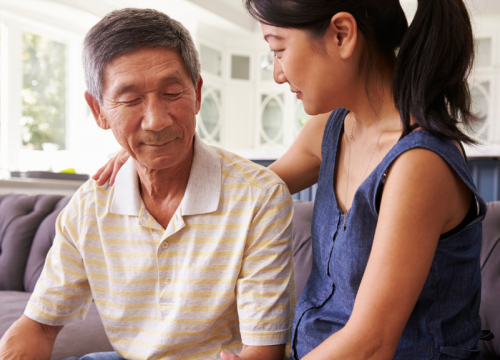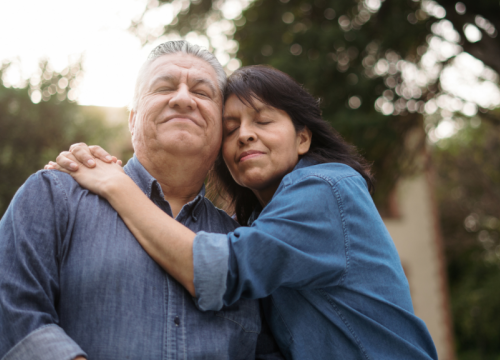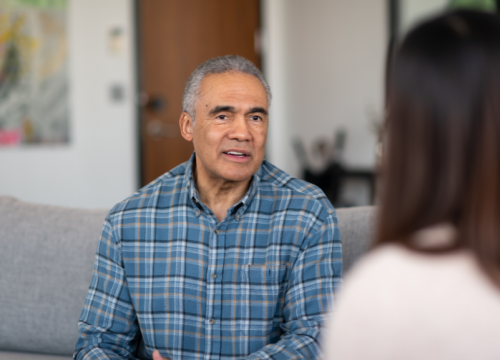Managing Anxiety in Parkinson's
Anxiety affects many people with Parkinson’s disease (PD) and can impact quality of life as much as movement symptoms. Recognizing
the signs of anxiety and understanding how it is connected to PD can help you manage symptoms and improve your well-being.
Quick Facts
- About 40% of people with PD experience anxiety.
- Brain changes that affect movement can also contribute to anxiety.
- Anxiety often makes other PD symptoms more difficult to manage.
Signs of anxiety:
- Ongoing fear or worry
- Feeling on edge or overly alert
- A sense of doom or dread
- Irritability or restlessness
- Unwanted, repetitive thoughts
- Sudden panic or terror
- Difficulty sleeping
- Trouble focusing
- Avoiding situations and places
- Physical symptoms like fatigue, racing heart, dizziness or nausea
- Excessive sweating
- Internal shaking or buzzing
Understanding Anxiety in Parkinson's
Anxiety can develop at any stage of Parkinson's. For some, anxiety starts before diagnosis. For others, it becomes noticeable around diagnosis, often intertwined with the emotions of a major life change. Anxiety may also develop or worsen as symptoms progress.
While the exact causes of anxiety aren't fully understood, several factors can contribute, including family history, brain chemical imbalances, health conditions and stressful or traumatic experiences.
Parkinson's can also play a role in different ways:
- Brain changes — Parkinson's causes a loss of dopamine, a chemical that regulates movement and mood. This loss, along with changes in other brain chemicals, can cause or worsen anxiety.
- "Off" periods — PD medication increases dopamine, but its effects can wear off between doses. When dopamine levels drop, movement and some non-movement symptoms, like anxiety, can worsen — sometimes without warning.
- Daily life with Parkinson's — Coping with symptoms often brings up a range of feelings, including frustration, fear and anxiety.
- Sleep disturbances — Parkinson’s impacts sleep in different ways. Poor sleep can worsen anxiety and other symptoms.
- Isolation — PD symptoms can make it more difficult to stay socially connected. This can increase feelings of loneliness and anxiety.
- Uncertainty — Not knowing how Parkinson's will affect quality of life or independence can create anxiety.
Recognizing Anxiety in Parkinson's
Anxiety can show up in different ways, such as constant worry, fear of social situations or sudden panic attacks. Sometimes there's no clear cause — just a lingering sense of unease or dread. Anxiety can also cause physical symptoms like a racing heart, nausea or fatigue.
Just as Parkinson’s impacts anxiety, anxiety can worsen PD symptoms like tremor or sleep issues, creating a difficult cycle.
Feeling stressed or anxious from time to time is normal, especially when living with a chronic condition like Parkinson's. However, if these feelings stick around or start to interfere with daily life, it is important to talk with your healthcare team.
Managing Anxiety in Parkinson's
Anxiety can feel overwhelming, but you are not alone. There are strategies and treatments that can help:
- Manage PD symptoms — If your anxiety is tied to “off” periods or symptoms in general, talk to your doctor about adjusting treatment. Tracking anxiety and medication timing can help identify patterns.
- Support mental health — Focus on one task at a time, organize your space and prioritize rest, healthy eating and exercise. Mindfulness techniques like yoga, meditation and breathing exercises can also help.
- Explore talk therapy — A therapist can offer support and tools like cognitive behavioral therapy for managing difficult thoughts and emotions. Ask your doctor for a referral or contact our Helpline.
- Stay connected — Combat isolation by reaching out to friends, family and support groups. Consider joining PD-specific groups where you can share experiences and discover strategies for managing anxiety.
- Consider medications — Antidepressants can help with anxiety and mood but may take time to work. Some also aid sleep or other symptoms. Talk with your doctor about options — and a psychiatrist if needed. Learn more at Parkinson.org/MedicationsBook.
Tips for Managing Anxiety
- Keep a routine. Predictable timing for medications, meals and rest helps lower anxiety.
- Have a plan. Work with your care team to develop strategies for managing anxiety when it arises.
- Loop in others. Let family and friends know that anxiety is often part of PD and how they can support you.
Related Materials
Episode 84: Managing Anxiety with PD
Expert Briefing: Mental Health and PD
Depression and PD: A Non-Drug Treatment Option
Related Blog Posts

Mental Health Tips for Cognition, Mood and Sleep

How to Advocate for Your Mental Health with Parkinson’s
